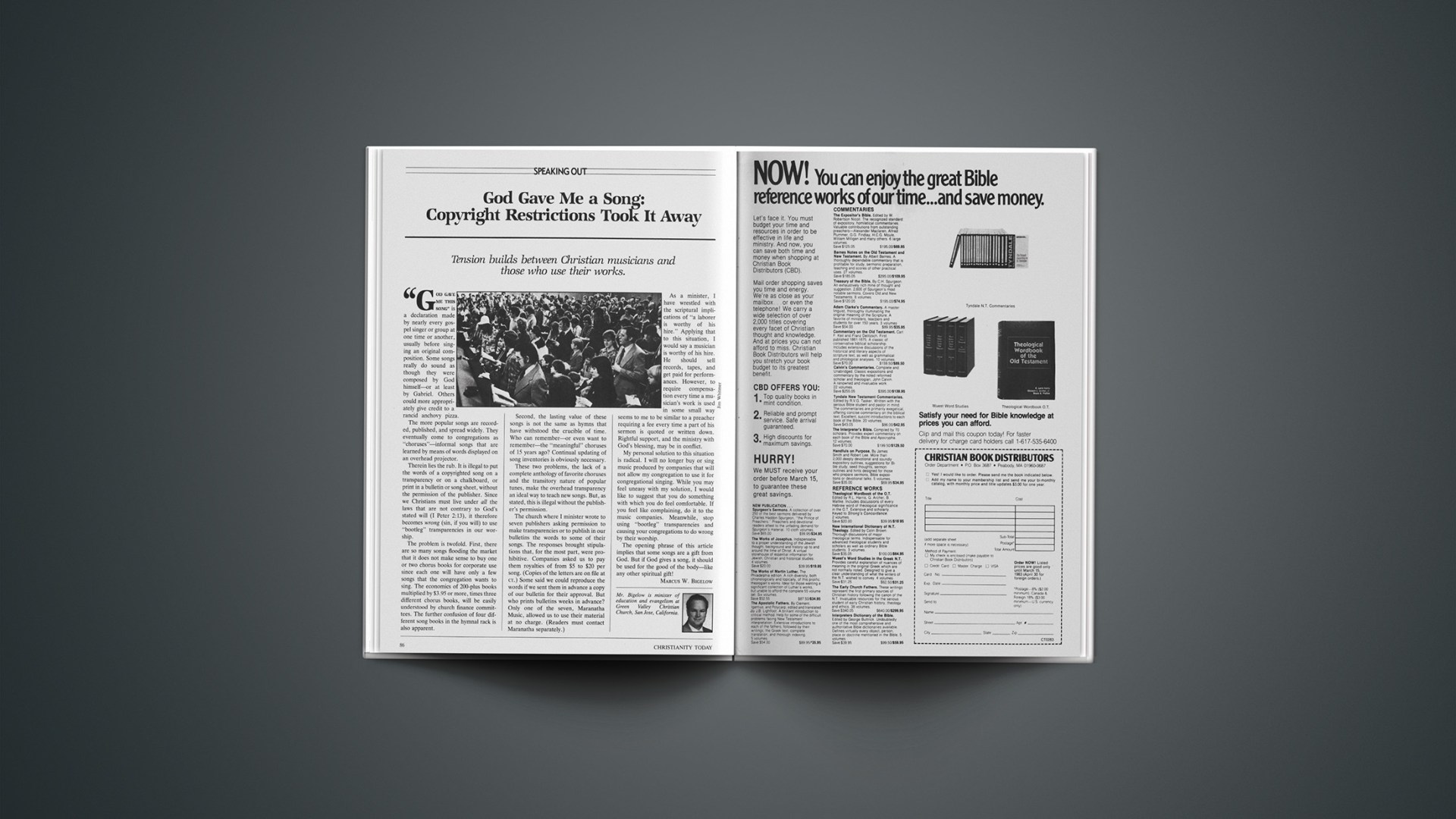Tension builds between Christian musicians and those who use their works.
“God gave me this song” is a declaration made by nearly every gospel singer or group at one time or another, usually before singing an original composition. Some songs really do sound as though they were composed by God himself—or at least by Gabriel. Others could more appropriately give credit to a rancid anchovy pizza.
The more popular songs are recorded, published, and spread widely. They eventually come to congregations as “choruses”—informal songs that are learned by means of words displayed on an overhead projector.
Therein lies the rub. It is illegal to put the words of a copyrighted song on a transparency or on a chalkboard, or print in a bulletin or song sheet, without the permission of the publisher. Since we Christians must live under all the laws that are not contrary to God’s stated will (1 Peter 2:13), it therefore becomes wrong (sin, if you will) to use “bootleg” transparencies in our worship.
The problem is twofold. First, there are so many songs flooding the market that it does not make sense to buy one or two chorus books for corporate use since each one will have only a few songs that the congregation wants to sing. The economics of 200-plus books multiplied by $3.95 or more, times three different chorus books, will be easily understood by church finance committees. The further confusion of four different song books in the hymnal rack is also apparent.
Second, the lasting value of these songs is not the same as hymns that have withstood the crucible of time. Who can remember—or even want to remember—the “meaningful” choruses of 15 years ago? Continual updating of song inventories is obviously necessary.
These two problems, the lack of a complete anthology of favorite choruses and the transitory nature of popular tunes, make the overhead transparency an ideal way to teach new songs. But, as stated, this is illegal without the publisher’s permission.
The church where I minister wrote to seven publishers asking permission to make transparencies or to publish in our bulletins the words to some of their songs. The responses brought stipulations that, for the most part, were prohibitive. Companies asked us to pay them royalties of from $5 to $20 per song. (Copies of the letters are on file at CT.) Some said we could reproduce the words if we sent them in advance a copy of our bulletin for their approval. But who prints bulletins weeks in advance? Only one of the seven, Maranatha Music, allowed us to use their material at no charge. (Readers must contact Maranatha separately.)
As a minister, I have wrestled with the scriptural implications of “a laborer is worthy of his hire.” Applying that to this situation, I would say a musician is worthy of his hire. He should sell records, tapes, and get paid for performances. However, to require compensation every time a musician’s work is used in some small way seems to me to be similar to a preacher requiring a fee every time a part of his sermon is quoted or written down. Rightful support, and the ministry with God’s blessing, may be in conflict.
My personal solution to this situation is radical. I will no longer buy or sing music produced by companies that will not allow my congregation to use it for congregational singing. While you may feel uneasy with my solution, I would like to suggest that you do something with which you do feel comfortable. If you feel like complaining, do it to the music companies. Meanwhile, stop using “bootleg” transparencies and causing your congregations to do wrong by their worship.
The opening phrase of this article implies that some songs are a gift from God. But if God gives a song, it should be used for the good of the body—like any other spiritual gift!
MARCUS W. BIGELOW1Mr. Bigelow is minister of education and evangelism at Green Valley Christian Church, San Jose, California.










